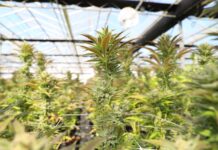No, just legal hemp, attorney says after Pawhuska police seize 17,000 pounds
The 17,258 pounds of plant material seized by Pawhuska police this week was industrial hemp, a product that’s legal to possess or transport nationwide, according to documentation from the purchaser and an attorney involved in the case.
Hemp and marijuana are products of the cannabis plant, but the former contains none of the intoxicating chemical compounds of marijuana and has been made legal in the U.S.
The products were sold at the Green Mile on Eight Mile Road in Detroit and Compassionate Care by Design in Kalamazoo.
Pawhuska police seized the shipment Wednesday morning while it was en route to a Colorado business and jailed the occupants of the truck and a van accompanying the shipment on complaints of trafficking marijuana in excess of 1,000 pounds, according to jail records.
Pawhuska police did not respond to multiple requests for comment since the arrests and seizure.
The Oklahoma Bureau of Narcotics and Dangerous Drugs Control was called to the traffic stop Wednesday, but the Pawhuska Police Department is the lead agency in the investigation.
“We don’t know if it is marijuana. We don’t know if it is hemp,” Mark Woodward, a spokesman for the OBNDD, said Wednesday.
The difference between the two can be apparent from visual inspection for those who know what they’re looking for, but only a chemical test can determine for certain whether cannabis plant material has a low enough threshold to qualify as hemp. Authorities in Oklahoma had taken the material for testing, but results were not available Friday.
James Baumgartner, president of the Colorado-based purchaser of the shipment, provided documentation showing the majority of the plant material tested at or below the federal threshold of three-tenths of 1 percent THC content for hemp. Cannabis that becomes medical and recreational marijuana, by contrast, typically has THC contents around 15 percent to 20 percent.
Baumgartner said Panacea Life Sciences ordered the shipment of hemp from Kentucky because the company’s needs were beyond what the 2018 hemp harvest in Colorado could support.
“Kentucky does a better job than just about every other state,” Baumgartner said. “What the state does is take very good control over the farming element. They quarantine it; they test it; and they certify it before they will let it be sold commercially.”
Baumgartner said a Pawhuska Police Department representative yelled at and hung up on one of his employees who called seeking information.
Osage County prosecutors said Thursday they had yet to receive an investigative report from Pawhuska police.
Pawhuska police reportedly stopped the truck in the city for failure to stop at a traffic control signal. Tadesse Degefu Deneke, 51, of Mobile, Alabama; Andrew Ross, 29, of Aurora, Colorado; David Melvin Dirksen, 31, of Comstock Park, Michigan; and Farah Warsame, 33, of Cleveland, Ohio, were arrested on trafficking complaints, according to jail records. They are scheduled for a court appearance at 3 p.m. Tuesday in Osage County District Court.
At issue is the THC content of the plants in the shipment, said Colorado attorney Mark Robison, who represents one of the involved entities. He said officers believed the seized material to be marijuana because of a field test.
Robison said law enforcers do not readily have the tools to determine whether someone has legal cannabis plant material. A field test for drugs, he said, “isn’t going to do it anymore.”
“We have a suite of paperwork that (proves the shipment) is hemp, but they jump to the conclusion that it’s marijuana and that it’s the biggest marijuana bust of all time,” Robison said.
The nearly 9-ton shipment was valued at about $850,000. A similar shipment of medical or recreational marijuana, Baumgartner said, would have been valued around $17 million. Panacea Life Sciences uses hemp to make its hemp oil-based products, including topical products and dietary supplements.
Baumgartner expressed concern that the shipment may sustain damage or degradation to the point where the material is no longer usable.
“Would you ship a $17 million product in cardboard boxes like that?” Baumgartner asked. “Right there, that tells you there are going to be discrete differences in how the products are going to be handled.”
The laws regarding cannabis became complicated when hemp became legal at the end of 2018 after an act of Congress signed by the president. Robison said there will be a learning curve for code that was enacted less than a month ago.
The Agriculture Improvement Act of 2018, also known as the 2018 farm bill, removed hemp from the Controlled Substances Act and provided protections for the interstate commerce of hemp.
The law says no state or Indian tribe “shall prohibit transportation or shipment of hemp” that was produced in accordance with the law.
Kentucky, where the shipment originated, tightly controls its hemp industry, providing testing procedures and disposal procedures should hemp test above the federal threshold.
Woodward said there remains much “gray area” with State Question 788, the farm bill and Oklahoma’s pilot hemp program.
“The Agriculture Improvement Act, there’s certain provisions of it that do allow for hemp shipments to be sent and potentially some shipments that may be outside of the AIA, so we will always take it on a case-by-case basis,” Woodward said.
Baumgartner and Robison said that, should the seizure result in financial damages with no criminal charges being filed, they would consider legal action for civil relief.























